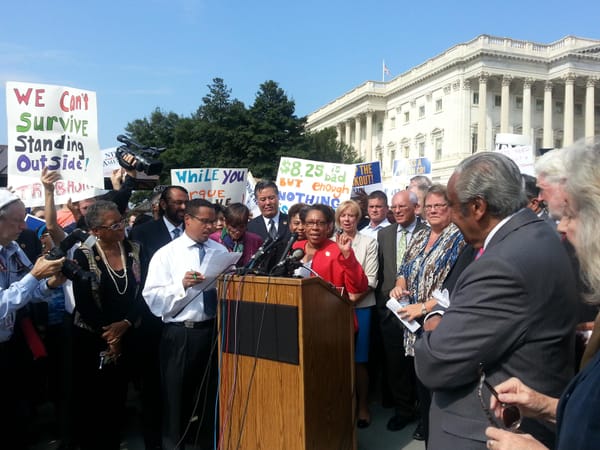Assessing the Biden-Harris record on freedom of movement

More Progressive - but not more liberal - than expected
President Joseph Biden entered the 2020 presidential field and was immediately, for better and worse, identified as the ‘establishment’, ‘centrist’ candidate of the major candidates with a real chance at winning. There description was not inaccurate, especially compared to the likes of Bernie Sanders and Elizabeth Warren - next to the charismatic socialist and the scholarly progressive, Biden indeed seemed to lack much a real political shape except for a tendency to the center. However, his presidency has shown this characterization miss the mark to some extent - while not representing the left wing of the party by any stretch, Biden does throw back to one of its progressive factions: that of the union and working class vote. While this has created some welcome surprises in areas like monopoly regulation and labor law, it comes with it a set of policies that are not exactly centrist, but certainly depart in important ways from liberalism. One is trade - Biden has not reverted to the free trade orthodoxy that led the Clinton and Obama Democratic party, maintaining ‘Buy America’ and other protectionist policies. Another, unfortunately, is freedom of movement: a primary election that saw serious proposals to decriminalize border crossing has given way to a presidential administration which has introduced little sweeping change. This particularly thorny issue is one with which Vice President and current nominee Kamala Harris is particularly associated, and so assessing the Biden-Harris record is extremely important.
The administration's defenders - and contrary to media reports, it has many! - would point out that Biden and Harris were working against a particularly powerful nativist tide, and that they have made real progress in spite of it, to the extent that progress is possible within the constraints of our electorate. I of course have been strongly of the opinion that Liberals needs to be full throated in defense of immigration as a positive good. However, there is a difference between a politician and an activist, though this can be difficult to remember. Henry George, in his work Protection or Free Trade , defined the different duties in this way:
The advocates of a great principle should know no thought of compromise. They should proclaim it in its fullness, and point to its complete attainment as their goal But the zeal of the propagandist needs to be supplemented by the skill of the politician. While the one need not fear to arouse opposition, the other should seek to minimize resistance. The political art, like the military art, consists in massing the greatest force against the point of least resistance ; and, to bring a principle most quickly and effectively into practical politics, the measure which presents it should be so moderate as (while involving the principle) to secure the largest support and excite the least resistance.
I take this as a fair guide to what to expect, and not, from a politician. Harris cannot be expected to come out in favor of open borders as she campaigns for president - much as I would prefer she did. The question then is - has the administration she served in been successful at pushing against those areas of the immigration system where there is the least resistance? An investigation into the record reveals a somewhat qualified positive response to this question.
Biden/Harris Policy Shifts
While the administration has not made a show of shifting immigration policy - and indeed, has tried to 'talk tough' on border security and famously had Harris instruct asylums seekers not to come to the border - it opened by introduced substantial reforms relative to the Trump administration. Naturally, among Biden’s first acts was to reverse former president Trump’s “Muslim ban”. Other changes affected far more people, even if they attracted fewer headlines. For example, the use of ‘Alternatives to Detention’, methods of tracking detained migrants awaiting a court date, has dramatically increased under Biden, per the Migration Policy Institute. Designed to deal with overcrowding, this shift has granted at least some semblance of liberty to those availing themselves of due process in their effort to gain residence in the United States. This shift, however, has come under court scrutiny, and its further implementation was blocked by a Federal judge in Florida last year; the administration has appealed.
Biden also shifted priorities for internal deportation proceedings, reducing the priority of many cases using the government’s broad prosecutorial discretion to focus limited resources on individuals deems a danger to the public. This decision has survived judicial challenges - others, like strengthening the DACA program, have not. Indeed, Biden has run into Federal Court challenges for many of his immigration programs - representing one major limit to his freedom of action in the area. At least two more exist - popular opinion, and state action. Republicans have regularly challenged Biden’s authority in court; the State of Texas has gone a step further in installing its own immigration barriers. Despite what seems a relatively obvious constitutional case that immigration policy is at the sole discretion of the Federal government, the Courts have yet to force the barriers to be removed. Biden could of course ignore the courts, or at least push his luck with what they’ll accept, but that pushes the question into the court of public opinion. And on the question of popular opinion, Biden is fighting against a hard tide - according to regular Gallup polls, only a about a quarter of Americans want to see more immigration, while a plurality want to see less - and a majority want to see substantial deportation of undocumented immigrants. Given these constraints, what has Biden indeed numerically delivered?
The Administration: by the numbers
It is indeed on the number of immigrants, not policy successes on paper, that Biden has had the most success against the headwinds of partisan opposition and popular nativism. The most recently released info from the Department of Homeland Security indicates that in Fiscal Year 2023, 1,172,910 individuals gained permanent residence in the United States, either through newly arriving or adjusting their status - a number exceeded only twice (2016 and 2006) in the 21st century. The number of people receiving citizenship through naturalization also reached levels not seen in a decade. The admittance of refugees has also made a rebound relative to extremely low levels under president Trump (even before COVID).

This is not to say there have been no quantitative disappointments - for example, the rising numbers of asylum seekers have actually prompted a rise in the number of removals, even relative to releases. According to Cato, over two and a half million detained asylum seekers have been released in the US in the first two years of Biden’s presidency - but slightly more than that were removed after their encounter with border patrol. While far more asylum seekers have been granted asylum, the enormous spike in applicants has led to a growing backlog of pending cases - a problem the next president will need to deal with. Most troublingly, limiting the ability of individuals to claim asylum to those who have "reasonable probability of fear of persecution or torture" when border crossings exceed 2,500 per day and until those numbers fall below 1,500 per day - a benchmark they have never reached. Expanded use of the CBP One App designed to make for a more orderly asylum seeking process cannot fully compensate for the loss of opportunities for asylees to make their case in the country.
However, it is difficult to imagine a much better outcome with a different administration (but, for example, the same media). Given public sentiment opposing greater level of immigration, the Biden administration seems to have found areas of weakness where they have appeared. Asking congress to do the responsible thing and change our broken immigration system - especially to one that respects a right to movement - has been unsuccessful, and is unlikely to make progress until the removal of the filibuster. The fact that Vice President Harris is has signaled an openness to removing the filibuster for abortion rights suggests that the day may come when the same is done to fix a broken immigration system. Where he has had discretion to act without the ineffective legislation, Biden has nonetheless achieved real, if limited, gains, gains which have changed the lives of hundreds of thousands of people. Kamala Harris will likely solidify and potentially expand those gains; by contrast, almost any successes achieved through executive action would quickly be reversed by a second Trump presidency. Building the case for true Liberality on the question of immigration will remain a task for liberals to pursue in with George's "zeal of the propagandist", while Democratic politicians remain our best chance for incremental gains on the ground.



